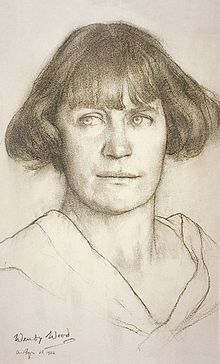
Wendy Wood (1932) by David Foggie
Wendy Wood
1892-1981
Campaigner and Politician
Wendy Wood (born Gwendoline Emily Meacham) was a well-known campaigner for Scottish independence and founder of the Scottish Patriots. An eccentric and colourful figure, she was also an artist and writer, and her antics often created controversy.
Wood was born in Kent, England, before her parents moved to South Africa, where her father was a brewery manager and landscape painter, and was brought up in the latter country. Wood adopted her mother's maiden name in 1927 to emphasize her artistic connections. Her mother's father was the sculptor S.P.Wood, and his brother was the painter T.P. Wood. Her birth name was Gwendoline Meacham. If challenged as to her Scottish birthright, she would reply, 'One does not have to be a horse to be born in a stable', echoing the old proverb that is sometimes misattributed to Arthur Wellesley, 1st Duke of Wellington, albeit for a different purpose.
In 1928 Wood was one of the founders of the National Party of Scotland, which grew into the Scottish National Party, but, in the 1930s, decided that a non-party approach to Scottish independence was more effective.
In 1932, Wood led a group of nationalists into Stirling Castle, then an Army barracks as well as being open to tourists, to tear down the Union Flag and replace it with Scotland's lion rampant. Eric Linklater wrote that she flushed the Union Jack down the toilet, and she sued him for libel, eventually settling out of court for a farthing damages.
In the 1930s she also founded the Scottish Watch, a youth organisation, which was very successful while she ran it. (This group is not to be confused with a later, unrelated extremist organisation of the same name.) In 1949, she had founded the Scottish Patriots, which, at the time of her death in June 1981, were some 2,000 strong.
In the 1950s came protests against the use of the regnal title "Elizabeth II" in Scotland, as Scotland had not had an Elizabeth I.
In 1960, Wood spoke to the General Assembly of the Church of Scotland, to try to mobilise them behind the re-convening of the Scottish parliament. This request was turned down.
Wood engaged in many international campaigns, for Irish causes, to the remembrance of the British concentration camps during the Second Boer War which killed thousands, to supporting the Indian independence movement and supporting the Icelanders in their 1970s cod war over fishing grounds.
In 1972 came Wood's hunger strike for home rule, which effectively failed, but in 1979, Scots were given a referendum on the matter: Scotland referendum, 1979.
In the early 1970s Wood often read Scottish stories on the BBC children's TV programme Jackanory under the name Auntie Gwen. Having spent over a decade as a crofter in Moidart (moving to Edinburgh in 1952) she had a wide span of experience to call upon. In all she wrote ten books, the last being her aptly titled autobiography, Yours Sincerely for Scotland.
To make your own nomination download the nomination form here